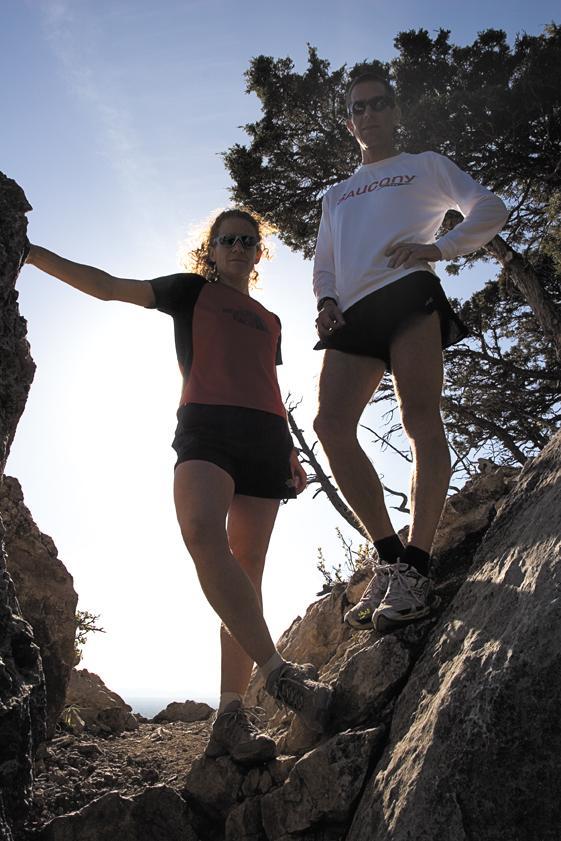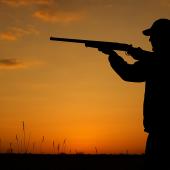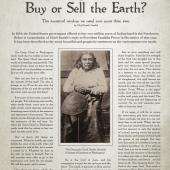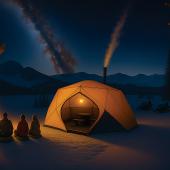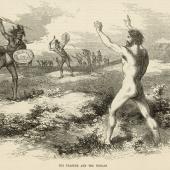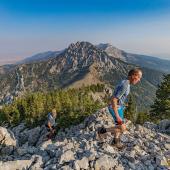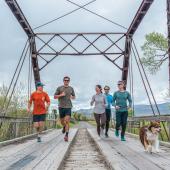Q&A with Scott Creel and Nikki Kimball
Scott Creel, an ecology professor at MSU, is a masters runner (over 40) who destroys competitors of all ages. The 2003 U.S. 50k trail champion has won ultramarathons and trail races at the national level and is seven-time winner of the Bridger Ridge Run (he holds the course’s six fastest times). He also won the 2005 Lewis and Clark Marathon. Nikki Kimball recently moved to Bozeman and practices physical therapy in Livingston. In 2005 she became the first woman to break the four-hour barrier in the challenging Bridger Ridge Run. Like Scott, she also won the 2005 Lewis and Clark Marathon.
Scott Creel
Outside Bozeman: What attracted you to ultras and trail running?
Scott Creel: Trails—I like being out in the mountains, and trail running is engrossing because everything is always changing: climbs, descents, mud, rocks, the occasional moose, etc. It's amazing how beautiful the places are that a person can get to in an hour or two of running. Ultras—I'm not sure anything really does attract me to ultras, other than being fairly good at it.
O/B: What is your favorite trail run in Bozeman?
SC: A few are: South Cottonwood, Kirk's Hill, “M” to Baldy, Sypes to Baldy, Middle Cottonwood to Saddle, Fairy Lake up the ridge, Stone Creek, New World Gulch.
O/B: Best thing about being a runner?
SC: Being out alone, pushing hard, and feeling your body respond to what you are asking. There is a hard-earned joy in facing a truly hard task and pushing through it, no matter what.
O/B: How many miles per week do you train?
SC: I don't write my training down, so I don't really know. I probably average the equivalent of about 90 miles per week, if it was all road running.
O/B: Are most of them on trails?
SC: Always trails on the weekend. I run to work and back every weekday, so some of that is on roads, but it's possible to do a lot of it on trails by weaving around Cherry-Holly, Peet’s Hill, Gallagator, Sourdough, etc.
O/B: How long until short shorts become a fashion trend again?
SC: Basketball shorts are for basketball. Real runners know this.
O/B: Do you run outside throughout the winter?
SC: Any kind of weather is more appealing than a treadmill. Most days, being outside is no big deal, and it's usually fun to be out in the really bad stuff.
O/B: Ever do a beer mile? If so, how fast?
SC: Loooong ago... six something.
O/B: Funniest or most embarrassing running moment?
SC: The Zane Grey 50-miler starts really early in the morning, and my coffee had not had time to produce the desired effect before we started running. About five miles into the race, it became clear that I was going to have to make a pit stop. I dashed into the pines and re-emerged onto the trail hopping along on one foot while I tried to get my shorts untangled from one shoe. I merged neatly into Paul Dewitt from Colorado who laughed so hard it was easy to pass him.
O/B: Advice for those considering ultras and trail running?
SC: I don't really think of myself as a trail runner or as an ultra runner... it is all just running when you get down to it. For the local trail races, it is definitely wise to get out on the hills, or your legs will pretty much turn to stone. A good general plan is to have one day of intervals, one day of hard steady running (20-40 minutes), and one long day each week. On the other days, run as you feel, and throw in a moderate run if you feel good. Otherwise, go easy enough on the easy days that you can go hard on the hard days. If you get above about 70 miles, consider two-a-days.
Nikki Kimball
Outside Bozeman: What attracted you to ultras and trail running?
Nikki Kimball: My friends and I ran trails in training for cross-country skiing without knowing that trail running was a sport. I went to grad school in Philadelphia, where the ski racing opportunities are a bit slim. Trail races provided the best study break I could ask for. During my sub-ultra-trail-race years, I seemed to get lost enough in races to inadvertently run ultra distances. So the progression was rather painless and completely natural.
O/B: What is your favorite trail run in Bozeman?
NK: Bangtail Divide trail: Great views, fun terrain, and quite close to town.
O/B: Best thing about being a runner?
NK: The knowledge that if my car breaks down at a trailhead 20 miles from a main road I can make it home on a bunch of water and some Hammer Gel.
O/B: How many miles per week do you train?
NK: Varies. I have a goal of a 4-6 week break from running every year... The rest of the year, I can run as little as 40 and as much as 100+. I cross-train a bunch, which helps me to avoid consistently high running mileage. Given the amount I race, I think the variety is essential to staying fit while avoiding injury.
O/B: Are most of them on trails?
NK: I run about half my mileage on trails. I think many trail racers make the mistake of avoiding roads and tracks all together. Successful trail racers are solid over rocky/rooty/gnarly ground, and have the leg speed to quickly carry them between the technical sections.
O/B: How long until short shorts become a fashion trend again?
NK: Manhattan High School had two teams at the Headwaters Relay last year; you'd be amazed how fast their boys can don a pair of capri-looking things after finishing a relay leg. They figure if they race fast enough perhaps no one can tell they've exposed some thigh.
O/B: Do you run outside throughout the winter?
NK: Hell yes! Minus-30 degrees is my cut-off for outdoor running. That doesn't create much need for treadmills.
O/B: Ever do a beer mile? If so, how fast?
NK: Not beer, but I can tell you sake during running doesn't enhance performance too much.
O/B: Funniest or most embarrassing running moment?
NK: In recent memory that would be the Leadville 100… I had an intestinal bug that, well, made for a really ugly racing scene. Aside from obvious discomfort and time lost at unplanned pit stops, I was unable to stay well hydrated. With my electrolyte balance thus thrown off, I had lots of extra little problems in my run, including difficulty thinking clearly. For the final seven miles, every time I looked over my shoulder I saw a headlamp (the race took me over 20 hours so it was dark), closing in on me. No matter how much my pacer told me there was no one behind me, I didn't believe her. I ended up racing the last seven percent of the race against a competitor who was the product of my own hallucination.
O/B: Advice for those considering ultras and trail running?
NK: Run because you love to run. If trail runs in beautiful places become just another chore, something's wrong. I think if one loves running and listens to her body, the results will come naturally. Trying to force higher mileages tends to lead to physical injury and mental staleness.

